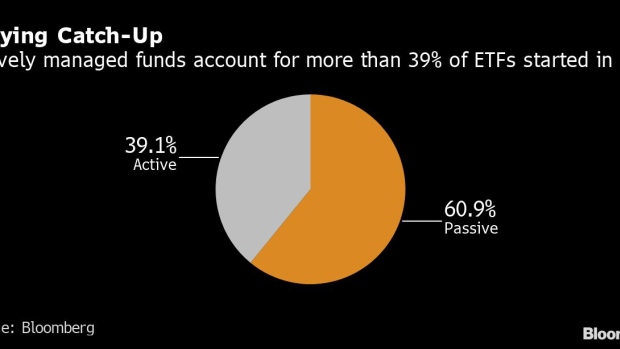Feb 18, 2020
American Century’s No. 1 Strategy to Win ETF Assets Is Choice
, Bloomberg News

(Bloomberg) -- American Century Investments is keeping its options open as it looks to make a splash in exchange-traded funds.
The $180 billion asset manager is moving ahead with plans for actively-managed ETFs that disclose their holdings like mutual funds after overcoming its final regulatory hurdle last week. The funds, which could now start trading within days, will join a diverse lineup of products that already includes three distinct types of ETF.
It’s an indication of just how challenging it is for newcomers to the $4.6 trillion U.S. ETF market, where more than 2,000 funds are already duking it out for assets. While indexed strategies oversee 98% of assets, more than 39% of funds started last year adopted an active approach to security selection. That’s raising the bar for stock- and bond-pickers that want to make an impact with ETFs, and need to figure out what investors want, fast.
“It makes sense for us to have more than one model to understand preferences,” said Edward Rosenberg, head of ETFs and senior vice president at the firm. “I don’t know which structure will do best with clients.”
So the firm is betting that several strategies could be the best one. American Century currently has 10 ETFs that all include a streak of active management, with products ranging from so-called smart-beta funds -- which follow indexes designed to mimic stock-pickers -- to actively managed fixed-income ETFs, to alpha-seeking equity portfolios. The latter, under the Avantis brand, are spearheaded by former executives from Dimensional Fund Advisors.
American Century now intends to debut two different flavors of ETF that don’t disclose their holdings every day. Growth and value strategies will rely on a model where the fund’s worth is published instead of its portfolio, while two other funds will distribute a proxy list of securities to indicate what they own. The rival structures are designed to stop front-running by competitors that could hurt performance.
This multi-pronged approach could “help American Century catch up to more established ETF providers,” according to Todd Rosenbluth of CFRA Research. “The belief is it’s too hard for active management to outperform cheap index-based strategies, but the reality is different.”
Mutual Respect
Diversification has become increasingly important for new ETF issuers. Legg Mason Inc., which is also looking to start active non-transparent ETFs, has active bond funds and smart-beta stock products. Meanwhile, Franklin Templeton started a series of factor-focused products, before debuting a series of country-specific ETFs. And JPMorgan Chase & Co. has grown into the 10th-largest U.S. issuer by embracing a suite of cheap, indexed products in combination with actively managed debt funds; it’s now also planning non-transparent funds.
Franklin Buys Legg Mason in an Effort to Survive Passive Era
But while having a spectrum of products can help a firm target several groups of investors, it can also muddy the brand. Janus Henderson Group Plc is closing two thematic funds that eschewed the firm’s name after they failed to win over investors. Traditional funds, such as the $1.3 billion Janus Short Duration Income ETF, resonated more with clients than these funds, which focused on organic food and weight loss.
“The risk is diluting the effort and having a lack of focus,” said Ben Johnson, co-head of passive strategy research at Morningstar Inc. “Some of American Century’s peers have also tried to enter the ETF world while staying true to their roots. At the end of the day, it’s a difficult balance to strike.”
Still, for now the firm’s strategy is paying off. American Century has attracted more than $1 billion in the two years since its first fund began trading, and its plan to be first out the gate with non-transparent ETFs has earned it numerous awareness-raising headlines.
“If there’s one thing we know about ETF launches, it’s that you never know,” said Eric Balchunas, analyst at Bloomberg Intelligence. “Playing a few hands at once increases the chance of success.”
To contact the reporter on this story: Ritika Gupta in New York at rgupta219@bloomberg.net
To contact the editors responsible for this story: Jeremy Herron at jherron8@bloomberg.net, Rachel Evans, Rita Nazareth
©2020 Bloomberg L.P.


